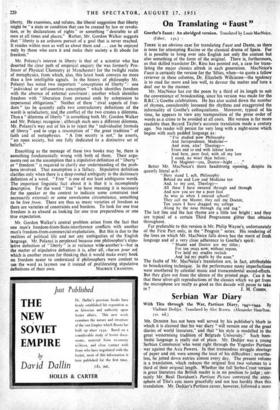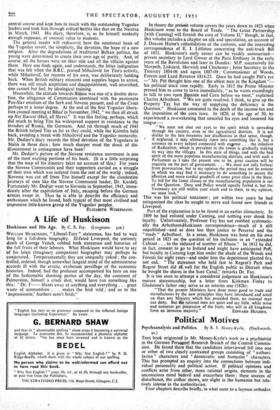Serbian War Diary
MR. DEDUER has not been well served by his publisher's blurb in which it is claimed that his war diary " will remain one of the great diaries of world literature," and that " his style is modelled in the great westernising tradition of Belgrade University." Such bom- bastic language is really out of place. Mr. Dedijer was a young Serbian Communist who went right through the Yugoslav Partisan war against the Axis Powers. In that tremendous struggle shortage of paper and ink were among the least of his difficulties ; neverthe- less, he jotted down entries almost every day. The present volume is a translation, which reduces the original first two volumes to a third of their original length. Whether the full Serbo-Croat version is great literature the British reader is in no position to judge ; cer- tainly Mr. Basil Davidson's Partisan Picture conveyed the atmo- sphere of Tito's epic more gracefully and not less hardily than this translation. Mr. Dedijer's Partisan career, however, followed a more central course and kept him in touch with the outstanding Yugoslav leaders and took him through critical-battles like that on the Neretva in March, 1943. His diary, therefore, is, as he himself modestly enough supposes, of unusual value to students.
The general reader will rediscoviL here the emotional basis of the Yugoslav revolt, the simplicity, the devotion, the hope of a new religion. After the degradations of traditional Balkan politics, the young were determined to create their own age of purity. And, of course, all the heroes were on their side and all the villains against them. Here one finds again, and understands, the bitter indignation that was felt when the B.B.C. praised Mihailovid for Tito's activity, while Mihailovie, for reasons of his own, was deliberately holding back. When British military missions and supplies began to arrive, there was still much scepticism and disappointment, well, nourished, one cannot but feel, by ideological training.
Meanwhile, the attitude towards Russia was one of a double devo- tion, the allegiance of Communists combined with the passionate Pan-Slav emotion of the Serb and Slovene peasant, and of the Croat perhaps to a lesser degree. At the end of the first Yugoslav libera- tion council meeting at Biha6 in November, 1942, " we then all struck up Hej Slaveni (Hail, all Slays)." It was this feeling, perhaps, which did much to bring Tito his widespread support in resistance to the invaders of Russia, the Germans. And yet through much of 1943 the British helped Tito as far as they could, while the Kremlin held back, avoiding a break with Mihailovid and the Yugoslav monarchy. Mr. Dedijer's diary records the blind devotion of the Yugoslays to Stalin in those days ; how much sharper must the shock of dis- illusionment in consequence have been!
Mr. Dedijer's picture of the Slovene resistance movement is one of -the most exciting portions of his book. (It is a little surprising that the map of his itinerary takes no account of this.) For years the Slovene Communists and their supporters carried on a struggle of their own which was isolated from the rest of the world ; indeed, Slovenia was cut off from Tito himself except for the clandestine journeys of men like the Slovene Communist leader,_ Dr. Kardelj. Fortunately Mr. Dedijer went to Slovenia in September, 1943, imme- diately after the capitulation of Italy, escaping before the German armies swept in. Thus he is able to describe the efficiency and enthusiasm which he found, both typical of that most civilised and impressive little-known group of the Yugoslav peoples.
ELIZABETH WISICEMANN.































 Previous page
Previous page